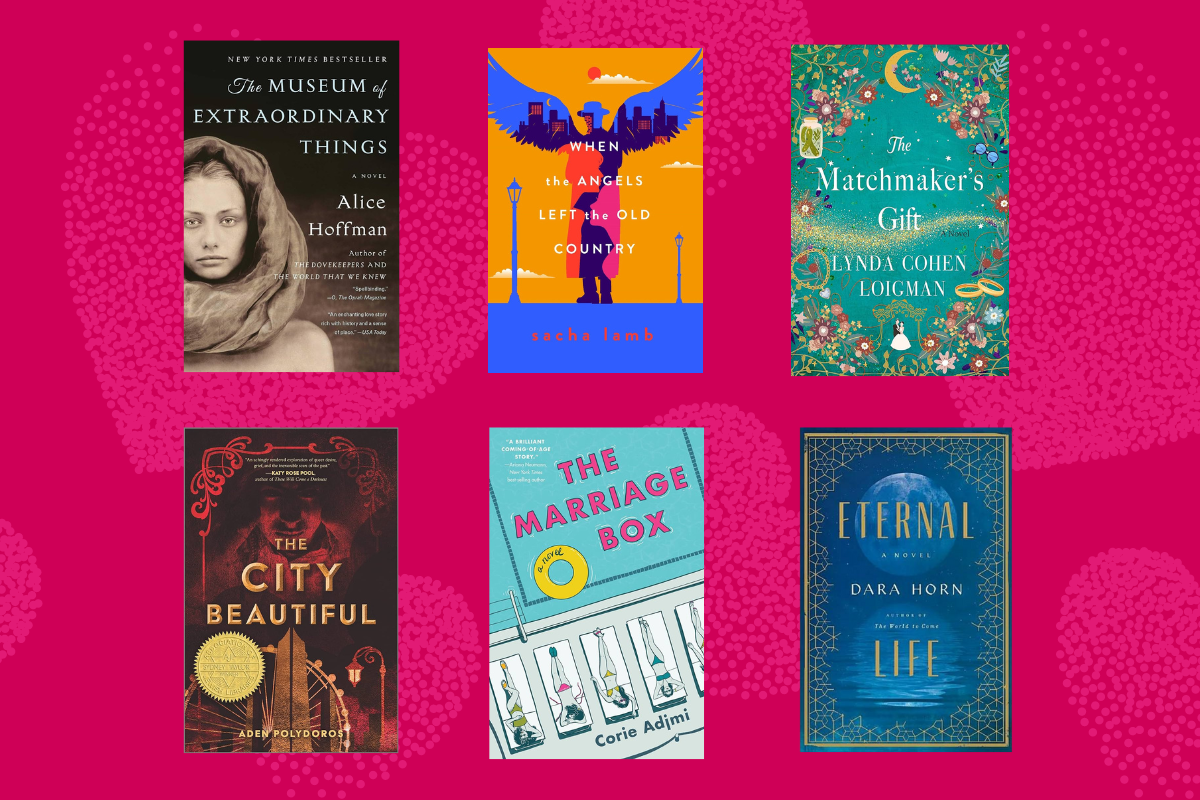Ah, Valentine’s Day: It’s not a Jewish holiday, but it’s a great excuse to partake in a little romance. And you’re in luck, because I’ve got some book recommendations that will satiate this appetite while supporting Jewish writers.
A list of Jewish Valentine’s Day books? Sure, but these ain’t your bubbe’s tired old romance novels. While the world of Jewish romance novels is currently thriving thanks to authors like Jean Meltzer and Rachel Lynn Soloman, there are lots of ways to define romance. Girl-meets-boy, courtship and happily ever after isn’t always how relationships work; there is no one-size-fits-all love story. To that point, I’ve assembled a list of very Jewish novels by Jewish writers that takes a diverse approach to romance. These are novels about love found, love lost, love that didn’t turn out exactly as planned and love that defies categorization.
First up is Alice Hoffman’s “The Museum of Extraordinary Things.” Hoffman will be a familiar name to Hey Alma readers. She’s had a long career writing bestseller after bestseller about complicated, unique, and in many cases, Jewish, characters. (Ever seen the movie “Practical Magic”? Hoffman wrote the book it’s based on!). While “The Museum of Extraordinary Things” is probably the closest thing to a conventional love story on this list, its gritty yet somehow ethereal setting in turn-of-the-century NYC and its compelling mystery add lots of twists. The protagonist, Coralie, works at her father’s freakshow, where she meets aspiring photographer Eddie Cohen. Things get complicated when Eddie, who dreams of life beyond his Orthodox neighborhood, finds himself embroiled in a scandal related to the Triangle Shirtwaist Factory fire. It’s part love story, part mystery, part period piece and all emotion.
If you like the historical setting of “The Museum of Extraordinary Things,” you should also check out Lynda Cohen Loigman’s 2022 bestseller “The Matchmaker’s Gift.” Love, marriage and relationships are at the center of this story, but not quite how you might expect. Set both in 1920s Lower East Side NYC and present-day Manhattan, this novel tells the story of Sara and Abby, a renowned matchmaker and her somewhat jaded divorce-attorney granddaughter. Readers get the backstory of how Sara fought to practice her calling as a shadchan, and what happens when Abby inconveniently discovers she might share this gift, as well (an awkward talent for a divorce attorney, if you ask Abby).
Jewish matchmaking and courtship are also at the center of Corie Adjmi’s “The Marriage Box.” When wild-child teenager Casey Cohen parties a little too hard, her parents send her away from New Orleans to live with her traditional Syrian Jewish relatives in New York. The culture shock is real, especially when she’s thrown headfirst into the dating scene and quickly finds a husband. However, Casey discovers that married life might not be all it’s cracked up to be in this coming-of-age novel.
To continue the theme of strong female protagonists, Dara Horn’s novel “Eternal Life” is another one you won’t want to miss. “Rachel is a woman with a problem,” the book’s blurb deadpans, “she can’t die.” In fact, Rachel has a lot of problems, most of which stem from the fact that she is immortal and carrying 2000 years of baggage with her (including an old flame — also immortal — who is convinced they still belong together and her very mortal, very useless middle-aged son). Wise, funny and moving, “Eternal Life” is hard to put down.
The supernatural also plays a huge role in “The City Beautiful,” a YA fantasy/thriller by Aden Polydoros. The 1893 World’s Fair in Chicago makes for a rich backdrop for the story, which is about a young, queer, Jewish immigrant named Alter Rosen, who — he believes — becomes possessed by a dybbuk after his love interest is murdered: one in a string of Jewish boys killed across the city. Desperate to unravel the mystery and avenge the death of his first love, Alter assembles a rag-tag team of street urchins (think “Oliver Twist” without the antisemitism) to investigate. In addition to the fast-paced plot, Alter’s ups and downs will compel readers forward as they wonder: Will he find his own happy ending, or will his need for vengeance swallow him whole? Readers should note trigger warnings for abuse of minors (it’s a YA novel, so it’s dealt with in an age-appropriate manner).
Another novel in the queer love/Jewish supernatural category is Sasha Lamb’s “When the Angels Left the Old Country.” This novel racked up an impressive array of critical awards, including the Stonewall Award, but has somehow flown under many readers’ radars. Uriel and Little Ash — angel and demon, respectively — are the only two non-humans who live in Shtetl (a Shtetl so small it doesn’t have a proper name), and they are desperate to escape to America. On their way to realizing their dream, they encounter others with the same aspirations who need their help, and the pair eventually takes on the task of searching for a girl from Shtetl who made it to America only to go missing from her new life. It has elements of fantasy, mystery, romance — not to mention a whole lot of queer representation and Jewish immigrant stories — that come together flawlessly.
Even if Valentine’s Day isn’t your thing, what better way to spend a gloomy February evening than curled up with a good Jewish love story and chocolate (heart-shaped or otherwise)? Just like the Jewish experience isn’t one-size-fits-all, neither are these novels, but the emotions they tap into will give you all the feels.



